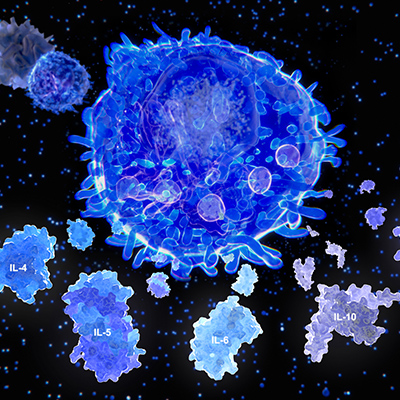October 10, 2022 -- A New York University (NYU) study finds that blocking the action of calcium signals in immune cells suppresses asthma in mice without compromising their defenses against flu viruses -- addressing a main concern of researchers developing immune-suppressing drugs.
The research, published online October 7 in the journal Science Advances, may eventually benefit 25 million Americans who suffer repeated episodes of wheezing, breathlessness, chest tightness, and coughing, primarily related to inhaled allergens.
Allergic asthma is characterized by increased type 2 (T2) inflammation, which involves a subset of T cells called T helper 2 (Th2) cells. Past research found that calcium release-activated calcium (CRAC) channels made up of ORAI1 proteins in T cells regulate their ability to multiply into armies of cells designed to fight viral infections. Without calcium entering through CRAC channels, T cells are unable to become Th2 cells and produce the cytokines that cause allergic asthma.
The NYU researchers showed that removing the gene for the CRAC channels reduced asthmatic inflammation caused by house dust mite feces -- a common cause of allergic asthma -- in the lungs of mice. Similarly, blocking signals sent through this channel with CM4620, a new CRAC channel inhibitor drug, also suppressed the Th2-driven airway inflammation in response to dust mite allergens. CM4620 is under development by the company CalciMedica.
"Our study provides evidence that a new class of drugs that target CRAC channels can be used safely to counter allergic asthma without creating vulnerability to infections," senior author Dr. Stefan Feske, NYU professor of medicine in the department of pathology, said in a statement.
Disclosure: Dr. Feske is a co-founder with financial interests in CalciMedica, which provided the CRAC channel inhibitor for this study.
Copyright © 2022 scienceboard.net









